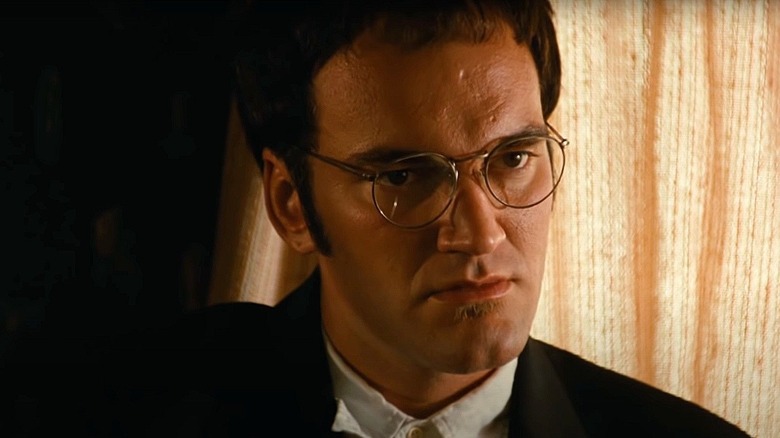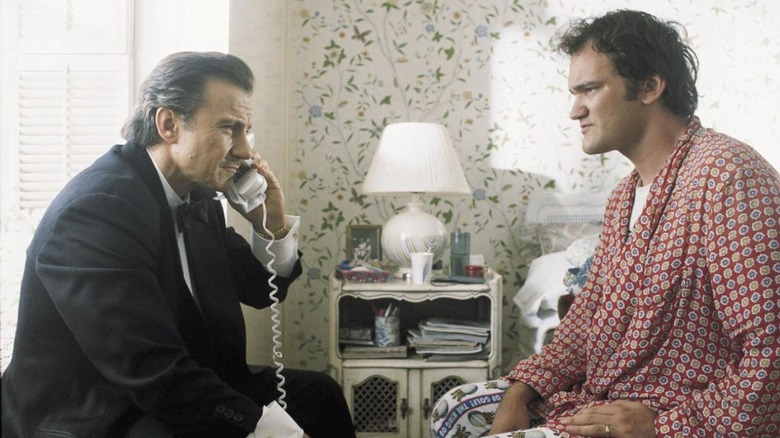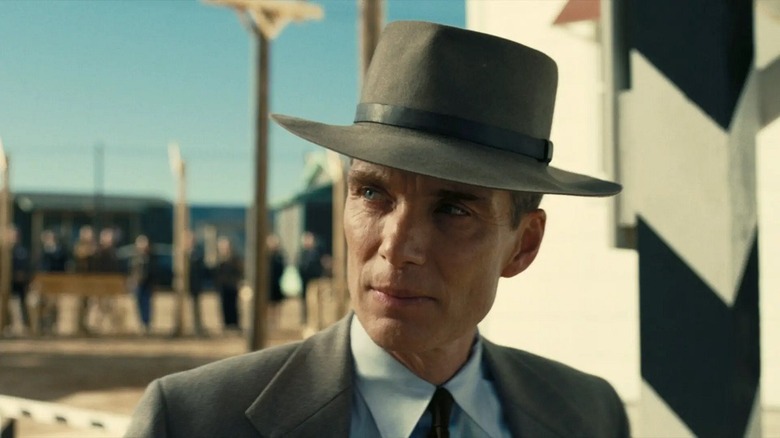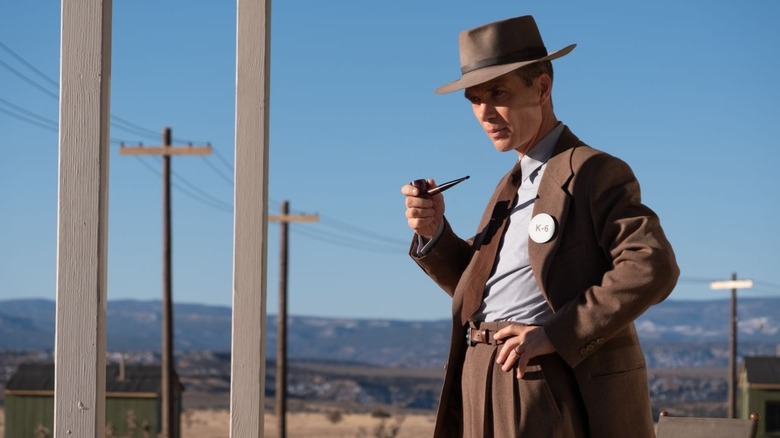Christopher Nolan Sees Quentin Tarantino's Retirement As The Filmmaker Respecting Film History
Christopher Nolan's "Oppenheimer" marks another groundbreaking entry into an already incredible canon of work, but could it be one of his last? Some of the director's contemporaries like Quentin Tarantino have taken a less-is-more approach to their filmography, vowing to restrict themselves to a certain number of films or stop directing by a certain age. Others, like Martin Scorsese, have decided to work for as long as they can and continue to put out new projects far past retirement age. As for which of these two routes Nolan will choose, he still isn't so sure, but he sees the good in both options.
"The truth is, I understand both points of view," Nolan told CinemaBlend. "It's addictive to tell stories in cinema. It's a lot of hard work, but it's very fun. It's something you feel driven to do, and so it's a little hard to imagine voluntarily stopping."
Lots of successful independent filmmakers never manage to break through into major studio releases with hundred-million-dollar budgets — many notable directors that released popular independent films around the time Nolan's "Memento" hit screens, like Hal Hartley and Todd Solondz, haven't made new work in nearly a decade. Nolan, on the other hand, has found continued mainstream success by venturing into more conventionally accessible genres, such as superhero films like "The Dark Knight" and sci-fi movies like "Interstellar." This success has enabled him to secure huge budgets for films with more politically complex subject matter like "Oppenheimer."
Due to his widespread critical, cultural, and commercial acclaim, it's hard to imagine a world where Nolan is unable to secure funding for one of his ventures. But if money won't stop him, would the director ever consider quitting filmmaking of his own volition?
Tarantino's next film will be his last
Tarantino has always been outspoken about quitting while he's ahead. He described filmmaking as a "young man's game" to The Hollywood Reporter back in 2012 and has since maintained that he is going to cap his filmography at 10 films. If the two volumes of "Kill Bill" are counted as a single project, his upcoming film, "The Movie Critic," will be his tenth feature as a director.
The "Reservoir Dogs" director confirmed that he will be "ending the filmography" with "The Movie Critic" in conversation with Deadline, but hinted that he may return to directing for a television series, short film, or play. Tarantino has always been vehement about ending his career before it starts to decline — whether due to the depreciating value of his own work or the changing world of cinema in general.
"I like the idea of going out on top," he expanded. "I like the idea of giving it my all for 30 years and then saying, 'OK, that's enough.' And I don't like working to diminishing returns. And I mean, now is a good time because I mean, what even is a motion picture anyway anymore?"
Staying in the game too long means losing touch with one's audience for Tarantino, a problem that many great filmmakers have fallen victim to towards the end of their lives. "I'm really well versed on a lot of directors' careers, you know," he explained to The Hollywood Reporter, "and when you look at those last five films when they were past it, when they were too old, and they're really out of touch with the times, whether it be William Wyler and 'The Liberation of L.B. Jones' or Billy Wilder with [...] 'Buddy Buddy' [...] I want to go out with a terrific filmography."
Nolan respects Tarantino's purist point of view
Nolan praises Tarantino's perspective as a fellow film-lover. He understands the "Pulp Fiction" director's argument about legacy, regardless of whether or not he will implement a similar ethos in his own career.
"Quentin's point has always been that [...] he's looking at some of the work done by filmmakers in later years and feeling that if it can't live up to the heyday, it would be better if it didn't exist," the "Oppenheimer" director elaborated in conversation with CinemaBlend. "And I think that's a very purist point of view. It's the point of view of a cinephile who prizes film history."
Tarantino wants to avoid having his filmography tainted by falling out of touch. He sees directors' bodies of work as being rated on a "grade-point average," as he explained to The Hollywood Reporter, and that every film risks bringing that average down. It's his view that "one of those out-of-touch, old, limp, flaccid-d*** movies costs you three good movies as far as your rating is concerned."
But it isn't just some abstract rating system that concerns Tarantino — the two-time Academy Award winner wants people with no prior knowledge of his work to pick out any of his films at random and be equally impressed by all of them. "I have to keep them wanting to go back for more," he continued. "They can't grab [Wilder's] 'Buddy Buddy!' They can't grab 'Buddy Buddy!' It can't — that can't happen!"
As for whether one bad movie tarnishes an otherwise incredible director's entire body of work, Nolan isn't so sure he agrees. In fact, the "Tenet" director isn't so sure that these "out-of-touch" movies from late-in-life filmmakers are so bad after all.
Scorsese's approach also appeals to Nolan
While Tarantino leads with his own judgment as a film critic, Nolan isn't so sure that he would be able to tell when he's lost his touch.
"I'm not sure that I would trust my own sense of the absolute value of a piece of work to know whether or not it should have been brought into existence," the five-time Oscar nominee told CinemaBlend. He continued:
"I'm a big fan, as is Quentin, of films that maybe don't fully achieve what they try to, but there's something in there that's a performance, or a little structural thing, or a scene, you know, that's wonderful. And so, yes, I understand. I think [I] wanted to keep a sort of perfect reputation of something, but also kind of don't want to take anything off the table."
This more open-minded approach means there could be many more Nolan movies to come in the future. The good news is that his fans have something to look forward to, but the bad news is that an otherwise great filmmaker could go on to produce some mediocre — or even terrible — work. As visual media evolves in the changing digital landscape, this threat of a failure to adapt becomes even more prescient.
Still, Scorsese's upcoming film "Killers of the Flower Moon" received positive critical and audience reception at its Cannes premiere, and the director is now 80 years old. When asked if he plans to get behind the camera again, he said that he's "got to," but that it may be "too late," per Deadline. "I want to tell stories, but there's no more time," he added with heartbreaking honesty.
It seems that, although he respects Tarantino's point of view, Nolan shares Scorsese's fervor to continue filmmaking for as long as he can — before time runs out.



